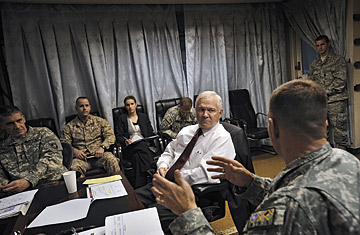
Gates being briefed at Camp Eggers in Kabul during a tour of Afghanistan last December.
(3 of 12)
If you were to ask Gates about his influence within the Administration, he'd stress that he serves at the pleasure of the Commander in Chief. But that too is a mark of his craft. "I have never seen anyone more effectively maneuver in the Executive Branch of the Federal Government than Bob Gates," says his old friend David Boren, the former head of the Senate Select Intelligence Committee who is now advising the White House on intelligence. "He knows just when to give his advice, to whom to give it, and he's extremely good at forming alliances with other people in the government to advance his point of view."
Those skills have made Gates perhaps the most powerful Defense Secretary since Robert McNamara ruled the roost in the Vietnam War era. But for the left, Gates is a disappointing compromise, a constant reminder of Obama's reluctance to fully repudiate Bush's conduct of the war on terrorism. "Gates is an agent of change within his own empire and not within the broader national-security construct. That is the risk Obama ran. He covered his flank but didn't get change," says a Defense policy adviser. White House staffers are no doubt uneasy about their dependency on this old Cold War hawk--as adaptable as he may be--which probably explains why none of them wanted to speak for this profile.
Just before Christmas, Obama invited Gates to the Oval Office and asked him to stay on. Gates agreed to remain for another year, though he told me it was highly unlikely he would finish the term.
So what does Robert Gates stand for? Is he one of the great Secretaries of Defense, in the mold of Henry L. Stimson or his idol, George Marshall--not just steward of the building but also architect of American national-security policy? Or is he merely a first-rate apparatchik, a gifted infighter and faithful servant? In this Administration, Gates is the key broker on the question that haunts every U.S. President: how and when to wield military force. But in the last years of a long public career, that makes him the face of a war in Afghanistan that is going badly and getting worse. "Gates has too much experience in D.C. not to get out when he's on top," says an old friend and admirer. But has he waited too long this time?
'General Gates'
December, Kabul. A cold fog drifted over the airfield. Gates was dressed in a brown bomber jacket, khakis and boots, ready to fly to Kandahar to visit the Stryker brigade that has been devastated by unrelenting Taliban IED attacks. Since their deployment in July, more than 30 soldiers from that brigade have been killed by roadside bombs. Gates had a message for them: "We're in this thing to win." Obama had said nothing of victory during his speech to the West Point cadets. "You can't tell soldiers to fight for a draw," says one of Gates' staff aides. But Gates never got to give his pep talk. There would be no trip to Kandahar, or anywhere for that matter. The helicopters were grounded by the Afghan weather.
